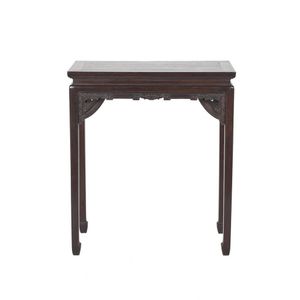Rare Zitan Table, Qing Dynasty, Finely Carved in Low Relief
A rare zitan table, Qing Dynasty, the rectangular top made of five boards supported by three braces on the underside, resting on a constricted waist and an apron pierced with angular spandrels on the corners of the squared-section legs terminating in scroll-hoof feet, finely carved overall in low relief, the side rails with a key-fret band, the waist pierced with interlocking rings above a swelling band detailed with cresting waves, all above the apron with stylised ruyi scrolls and studded with bosses extending along the outer surfaces of the legs, the wood of a dark brown colour, 26.77 in. (length) 32.2. Cm (width) 31.38 in.high
You must be a subscriber, and be logged in to view price and dealer details.
Register Now to view actual auction price for this item.
- Zitan Wood - Zitan is the most expensive, and since ancient times, has been considered the most precious of woods.
Zitan wood is the hardest and heaviest of all hardwoods. It is purplish-black to black in colour, and with a grain so dense it is virtually invisible.
Zitan can usually only be obtained in quite narrow strips and so it is rare to find large pieces of furniture made from this wood. True Chinese rosewood is a variety of zitan and is very rare. - Qing Dynasty - The Qing Dynasty was the last imperial dynasty of China, ruling from 1644 to 1912. It was established by the Manchu people, who originated from the northeastern region of China. The Qing Dynasty was preceded by the Ming Dynasty and followed by the Republic of China.
- Ming Dynasty - The Ming Dynasty was a ruling dynasty of China from 1368 to 1644. It succeeded the Yuan Dynasty and preceded the Qing Dynasty. The Ming Dynasty was established by Zhu Yuanzhang, a former Buddhist monk who became a rebel leader and eventually overthrew the Mongol Yuan Dynasty. During the Ming Dynasty, China experienced a period of relative stability and prosperity. The government was centralized and bureaucratic, with the emperor at the top of the hierarchy. The Ming Dynasty is known for its cultural achievements, including the development of porcelain, the invention of movable type printing, and the construction of the Great Wall of China.
This item has been included into following indexes:
- Chinese furniture, chairs - chairs, Qing dynasty 347
-
Chinese furniture, tables
- tables, hall and side 227
- tables, low 113
- Chinese furniture, timbers - zitan wood 34
- furniture, period or style - oriental 1,735
